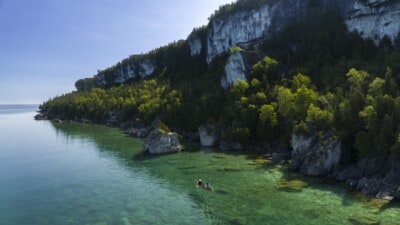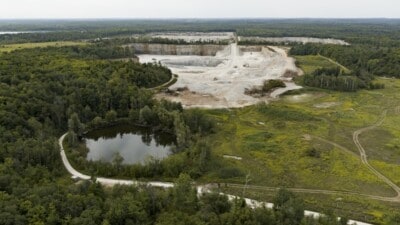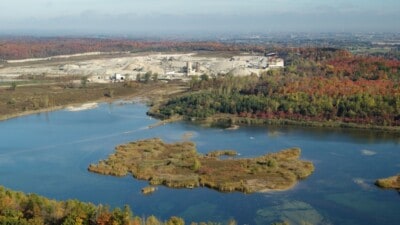The movement to acknowledge the severity of our climate crisis gained incredible momentum in 2018-2019, with Fridays for Future protests taking place worldwide, and environmental activists like Autumn Peltier and Greta Thunberg amassing millions of followers. But then COVID hit, and both the media headlines, and our attention, quickly shifted.
The “great pause”, however, has provided many of us with a newfound appreciation for nature. Hobbies like birdwatching and hiking have surged alongside COVID-19 cases; lockdown has forced us to see our immediate surroundings with a fresh perspective. We’re all valuing nature a little differently than before.

“The grind has slowed and the observation and stillness that has happened from being in one place has been a beautiful thing,” says musician Sarah Harmer, who after a ten year hiatus, released a new album Are You Gone in February (moments before the pandemic made a worldwide appearance).
For dedicated fans, who’d waited a decade, hearing her euphonious voice sing new lyrics was deeply satisfying. But that’s not why I was interviewing Sarah—our chat was more about hugging trees and rare sightings of slippery Jefferson salamanders. You see, in the years that Harmer took a break from making music (and even before that) she was busy getting her hands dirty in environmental activism, while also rekindling a relationship with the land that she grew up on.
As a child living on a farm, on the outskirts of Burlington, Sarah spent a lot of unstructured time tumbling through fields, and running wild through the forests that surrounded her home. The breathtaking scenery of the Niagara Escarpment was a beautiful place to grow up, but not something she fully realized until making return trips home as an adult, “It was after touring as a musician, and travelling to places, that I came back to the farm and realized, ‘Wow, this is incredibly rich biologically!’ I realized that the place I had grown up is world class.”

Her deep relationship with the land is what led her to co-found Protecting Escarpment Rural Land (PERL) in 2005, an environmental conservation organization created to help protect and ecologically preserve a sensitive area of the Niagara Escarpment Biosphere Reserve. “Balance is hard to achieve, but maintaining what we have is really priority number one, when you’re talking about biospheres…we’re not making any more of those! We can’t, as humans, think that we can create complex ecosystems in a generation or two,” she says resolutely.
It is this idea of preservation that TVO’s nature documentary series Striking Balance, narrated by Blue Rodeo’s Jim Cuddy, sets out to explore. In Season 2, each episode examines the critical role biosphere reserves play in preserving Canada’s rich ecosystems and the ways people are creating symbiotic relationships with nature to develop sustainable economies.
This week’s episode focuses on the Niagara Biosphere, and Sarah is one of the many local characters in it. “Developing relationships with places and parts of the living world give you the determination to stand up for it if it becomes threatened,” she says, deeply invested in the episode’s content, which shares the fascinating intricacies of the land that played a significant role in nurturing her childhood—the land she’s fought hard to protect as an adult.
“What came back to me, after watching the documentary, was the dangerous overconfidence of industry, or man – or human hubris – when we think we can interfere so much with a living system, and then try to recreate it. Create systems for pumping the ground water in perpetuity. Trying to replicate the complexity of nature can be really dangerous and very destructive. It’s easy to get caught up in this idea that ‘oh, we can destroy something and then we can just rebuild it!’—that god complex is dangerous.”
With the region being one of the fastest growing in Canada, there’s a lot to be considered, and preservation is increasingly difficult, even with safeguards in place.
Wineries, eco-tourism, farmland, excavation, housing development —there are a lot of stakeholders in this area which boasts some of the most fertile land, oldest rock, and cleanest drinking water in Ontario. While no one can argue that the escarpment, which was formed 400 million years ago, is a geological wonder, there are still many conflicting ideas of how and what the land around it should be used for. After fighting a local aggregate company for years, Sarah knows how infuriating the process can be to preserve life.
“There has been a mushy middle ground for a long time and our regulators, or government officials who are in charge of enforcing our endangered species act, or enforcing carbon emissions or whatever – have not stood up to corporate bullying,” she says, which is in part, why she greatly admires the work of young activists, like Peltier and Thunberg, “They have a clarity of vision – there are lines to be drawn in the sand. And I see that with a lot of grassroots Indigenous leadership in Canada—there’s a backbone. It’s heartening and inspiring.”
COVID has quieted the youth-led environmental movement to some degree (or perhaps more accurately overshadowed it) but the virus has helped adults wake up. “The pandemic has been really instructive for showing us how interconnected we are, and that what we do to the living world we are also doing to ourselves.”



 Follow Us On Instagram
Follow Us On Instagram

 Drag shows, op
Drag shows, op
 This Thursd
This Thursd